Privacy Protection and Competition in the Digital World
The concentration of personal data by digital platforms raises questions about the cross-fertilisation of privacy and competition policies, particularly when personal data becomes a source of market power that can lead to abuse. Faced with these intersecting issues, competition authorities and data regulators are developing collaborations and reflections are emerging on new regulatory methods.
In the digital realm, privacy protection is closely linked to the concept of personal data. Privacy protection can be defined as the control of data relating to each citizen that other stakeholders have access to.
The digital economy has given rise to cross-cutting, complex and ambivalent impacts between privacy protection and competition, blurring the lines between these two, historically distinct policies. Safeguarding competition may result in a restriction of the personal data collected by a platform or in authorisations granted to competitors to access data owned by other companies, bolstering or weakening privacy protection. Similarly, more stringent privacy protection may increase competition by restricting data accumulation, a potential factor for establishing a dominant position, or may reduce competition by generating compliance costs that have a relatively greater impact on small companies.
The European Union and national authorities are striving for improved coordination between these two policies. The Digital Markets Act and the Data Governance Act address these issues at European level. The competition authorities are also attaching greater importance to personal data-related issues: in the name of privacy protection, several national authorities have launched investigations into the practices of platforms to ascertain whether they constitute anti-competitive conduct. To address these issues, various regulators are increasingly cooperating with each other.
If consumers were more aware of the value of their data, the goals of competition and privacy policies would be less conflicting. Today a “privacy paradox” is apparent: while Internet users are concerned about protecting their privacy on the Web, they still freely give out their data to companies, notably because they unable to determine its value. A 2016 European Commission survey revealed that 64% of Europeans questioned believed that tracking user activity online in exchange for free access to a website was unacceptable, even though 74% of them would not be willing to pay in order not to be monitored (see chart). Thus, while Europeans are mainly concerned about their online activity being tracked, very few would be happy to pay to visit web pages.
